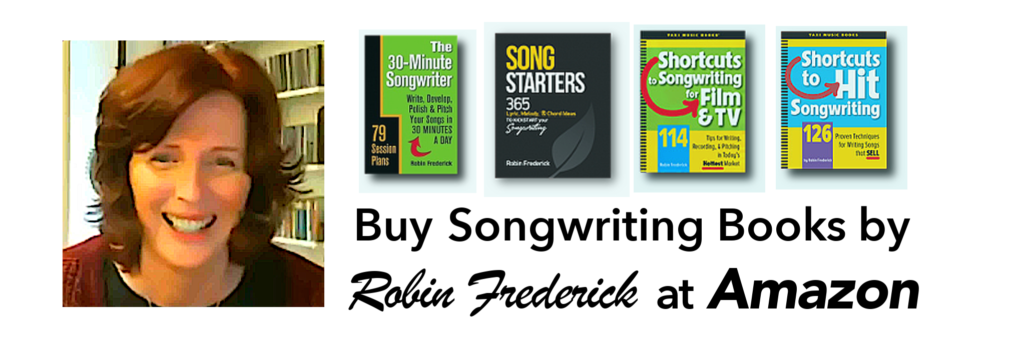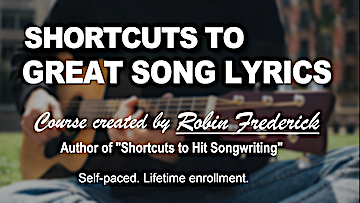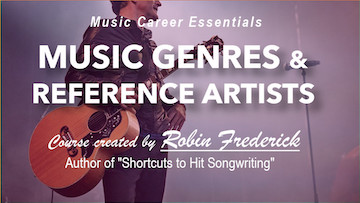Q: I’ve got a song that I know is good. My friends and family all say it’s as good as anything on the radio. Now what do I do? Do I need a demo? Should I copyright it? Should I join ASCAP or BMI? Where do I send it? How do I sell my songs?
A: If you’ve written a song that sounds like it could appeal to today’s listeners—one that has a memorable chorus, a focused lyric with a fresh approach, and a contemporary, radio-friendly melody—then you can start thinking about how to pitch your song to music publishers, record labels, music libraries, and recording artists. If you’re thinking about becoming a recording artist yourself, remember that many of today’s top artists and producers started out as songwriters with publishing deals, so it’s a great first step.
Songwriters rarely “sell” their songs. When you make a deal with a publisher, record label, or artist to record your song, it’s usually in the form of a contract or license. Sometimes a publisher will use the words “work for hire.” This means that they will own your song copyright. Any contract you sign with them should include language that ensures you will receive the writer’s share of royalties of all kinds and participation in any fees received, plus other safeguards. Be sure to consult a music business attorney before signing any contract.
I’m going to focus on the Pop genre in this article, but you can apply all of these ideas to Country and Rock styles. Hopefully I can answer your questions. Let’s start by figuring out who might want to sing your song.
Who is looking for songs?
If you listen to the songs that currently popuar—and you should if you want to be a successful songwriter—then you know that today’s hits include songs recorded by a wide range of artists, like Katy Perry, Justin Bieber, Maroon 5, Marshmello, Tim McGraw, Sara Bareilles, P!nk, and OneRepublic among others.
Some of these artists write or co-write their own hit songs while others, like Tim McGraw, actively look for songs that will help them climb up the music charts. If you’re interested being an artist yourself, you’re going to be looking for exactly the same type of strong hit singles as they are—songs that have lots of radio appeal, strong contemporary melodies, and vivid lyrics that grab the listener’s attention.
Study success to be successful
All successful songwriters listen to and study songs that are currently successful to find out what today’s listeners like. I strongly recommend taking the time to look inside today’s hit songs to see what makes them tick.
I’ve analyzed some of today’s top hits to get you started. You’ll hear a range of lyric and melody writing techniques you can use in your own songs that will help you write and pitch your songs successfully.
What are the odds?
Okay, reality check… Reaching an established artist when you haven’t yet built up a track record as a songwriter can be difficult. These artists tend to use songs by writers with a proven track record, or they write the songs themselves, or co-write with the album’s producer. So to even up the odds, consider pitching your songs to artists who are just starting out.
Pitch your songs to new artists
Look for new artists whose careers are about to take off, especially singers who come up through competition shows like The Voice or The X Factor. If you’re an unknown songwriter, these artists are likely to be your best bet. All of the winners and finalists in these shows are hungry for songs that sound like they have the potential to get radio airplay. So how do you get your song to them? Try a DIY approach using these three tips…
=> First, study their performances in the competition.
What kinds of songs do they excel at? Big choruses? Intimate verses? Soaring melodies? Are they better at Pop/Rock or Country? Write a song that will make this artist sound good, one that makes use of their strengths, something with a fresh, contemporary feel and an appealing theme.
=> Second, look for contact info.
These artists’ careers are just getting off the ground. They may be deciding which label to sign with. They may not yet have a team of professionals working with them.
Do your research; find out all you can. Interviews—online and in magazines—are a good resource. Check out their YouTube channel and Facebook pages. Are there any contact addresses or names you could use? Look for a manager or agent. Can you contact that person via email, Facebook, Instagram, or their own website? If you get in early, it’s easier to get this information.
Once you have contact info, send an email with a link to your song. Most people don’t want to receive large files (and some email programs block them) so don’t send your song as an attachment unless requested. Make it easy for them to hear the song and read the lyrics. You can load it up on SoundCloud.com and keep it private. Send the link that SoundCloud gives you for the private file.
=> Third, try a “grass roots” campaign.
If your research doesn’t turn up a viable contact or you don’t hear back, get involved with the artist’s fans. There should be groups of fans on Facebook, Instagram, Tik Tok, Twitter. Be sure to participate as a fan. Find out which songs the fans like best, which songs they’d like to hear the artist record. Now make your song public on SoundCloud and post a link asking for opinions. (This public link will be different from the private link.)
If the fans are excited about your song, someone close to the artist is going to take notice.
The DO’s and DON’T’s of pitching your song
Be sure your song is appropriate for today’s artists.
No matter who you’re pitching to, be sure your song is contemporary and age-appropriate. A teen artist with a youthful following can’t sing a song about marriage and raising kids.
Use language and themes that are current for today’s Pop genre. Avoid pitching songs and demos that sound dated. If you love retro styles like Motown and ’50s Rock, give these styles a contemporary edge. Good examples are “Classic” by MKTO, “Grenade” by Bruno Mars, and “Everybody Talks” by Neon Trees. Listen to these songs and see if you can identify the retro vs. contemporary elements.
Copyright your songs before you pitch.
In the United States, you can copyright songs and sound recordings at www.copyright.gov. Save money by copyrighting songs as a group on a single form. International copyright laws vary from country to country. Be sure to check the copyright requirements where you live and contact the appropriate agency.
Read more about copyrighting your songs.
Record a demo that sells your song.
When you pitch your Pop song to anyone in the music business, your demo needs to put across the feel and energy that a final recording will have. If your song is played for someone who can’t hear the potential, it stops right there.
The good news is, you don’t have to record a complete track with all the bells and whistles. A stripped-down demo will work BUT everything on that demo needs to be played well and accurately. No pitchy vocals, no stumbling rhythm guitar, no dated drums. For the Pop genre, the mix needs to be clean and punchy with a very clear, confident vocal. You can find online music producers and singers on websites like Soundbetter.com and Airgigs.com. For Country, consider one of the excellent Nashville demo studios, like Pearl Snap Studios for in a range of popular singer-songwriter styles.
If you’re writing in a production-heavy style like the Dance/Pop genre you could look for a co-writer who can create basic, contemporary dance tracks. You contribute lyrics and melody, referred to as topline. The song copyright is split 50/50 with the creator of the track.
Find out more: Can you pitch a home recording? (Hint: You can.)
Pitch your song to a music publisher
Artists will get songs from a wide range of sources, including their record label, manager, producer, studio musicians, friends, loyal fans, and family.
But to pitch your song to established artists, your best bet is to go through a music publisher. But there’s a catch. Music publishers will not listen to unsolicited material. You can’t just send them a CD. So, you need to get them to come to you!
Music publishers (and record labels) are always on the lookout for writers and artists who are creating a buzz. You need to get yourself noticed. And it’s easier than you might think. Here’s an idea that really works.
1. Make a simple lyric video and upload it to YouTube. Use a digital distributor, like CD Baby or DistroKid, to get your music on Spotify and Apple Music.
2. Once you’ve done that, then use SubmitHub to pitch your song to playlists and blogs. A mid-sized to large playlister can get your song in front of thousands of listeners. Some of my students have gotten tens of thousands of listens and launched their careers this way. If listeners are excited by what they hear, you’ll soon attract the attention of the music industry.
TIP: Most music publishers will not listen to unsolicited material so don’t send a CD or link in an email without asking for permission. If you have a contact name and email address, you can send an email with a short industry bio and information about your fanbase, number of streams and downloads, any film & TV placements, touring, or other credits and a link to your website where they can hear your music.
If you have trouble getting through the publishing door, go back to the “grass roots” approach I mentioned above.
Use a pitch sheet or music event
You can also reach music publishers through pitch sheets like the one at TAXI.com and songwriter conferences like the Durango Songwriters Expo, the TAXI Road Rally, or the ASCAP Experience. These avenues should give you access to one or more music publishers.
There are a few contests that can also get you noticed. Eurovision has worked for some songwriters. The John Lennon Songwriting Contest is well respected and has highlighted some excellent songs.
Research ASCAP or BMI, even if you aren’t a member
You can find the contact info for the publishers of many of the songs on today’s Pop charts by searching the repertoire at ASCAP.com and BMI.com. Search by song title or artist. The results should include the music publisher’s contact information.
By the way, you don’t need to join ASCAP, BMI, SESAC or any of the Performing Rights Organizations (PROs) until there are royalties to collect, meaning when someone has recorded and released your song commercially. However, there’s one exception. If you’re going to pitch your songs to music libraries —publishers who specialize in film and TV licensing—then you should go ahead and join a PRO.
Writing a hit song doesn’t mean writing a bad song
You’ve probably heard people say that everything on the radio is terrible, or it’s all about writing to a “formula,” or a certain song is a hit because the record label spent tons of money pushing it. While those things may contribute to a song’s success, the song itself still has to stand on its own merits. All the money in the world can’t force listeners to like a bad song, and if there were a formula for writing hits, we’d all be doing it.
There are great songs out there that people genuinely love listening to – ones that you love listening to. Those are the songs you want to aim for. Look for successful songs that move you and let them inspire and guide you.
Good luck and may your songs flow!
Robin




